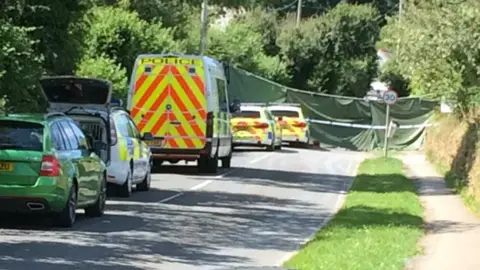Cornwall hit-and-run death: Parliament could revise penalties
 Family handout
Family handoutFamilies have called on MPs for a change in the law with harsher sentences for hit-and-run drivers.
It follows the case of Ryan Saltern, 31, who was killed in 2019 at St Teath in Cornwall.
A man was given a suspended sentence of four months after admitting failing to stop and report the accident.
Transport minister Andrew Stephenson told a debate in parliament: "We agree there may be something wrong with the law as it stands."
Cherilyn Mackrory, Conservative MP for Truro and Falmouth, told MPs the punishment handed to the driver in the case of Mr Saltern was "woeful".
Mr Saltern's family had been left "bereft of justice", she said.
"The punishment does not fit the crime," she said.
"I was incredibly moved by the number of stories similar to Ryan's.
"They are all too common and we must do something positive."


What happened in the case of Ryan Saltern's death?
Wayne Shilling, 39, of St Teath, was driving home from a carnival in St Teath in July 2019 when he hit Mr Saltern, who died at the scene.
Shilling was given a four-month suspended sentence, disqualified from driving for 12 months, given an evening curfew for four months and ordered to pay a £207 victim surcharge and prosecution costs.
He had been drinking at a bar at the carnival and according to one witness was "away with the fairies".
Police were only told of his involvement 36 hours after the crash by a member of his family.

A petition by Mr Saltern's family and another from the families of two young men killed on motorcycles urged increased penalties for hit-and-run drivers who cause death.
Currently hit-and-run drivers face a maximum sentence of six months where there is no other evidence of careless or dangerous driving.
Mr Saltern's family are calling for a minimum 10-year sentence with a maximum life sentence, a so-called Ryan's Law.
Ben Bradshaw, Labour MP for Exeter and a member of the House of Commons Transport Committee, said the maximum sentence "might be appropriate if you have scratched someone's car, but it is not appropriate if you have someone dying".
Mr Stephenson said: "We understand the tragic circumstances that have led to these petitions and the concerns that in some cases the law does not work as it stands".
But he urged against making "rash decisions".
He said: "We agree there may be something wrong with the law as it stands" and said "any change in the law should fit the driving offences framework".

Follow BBC News South West on Twitter, Facebook and Instagram. Send your story ideas to [email protected].
